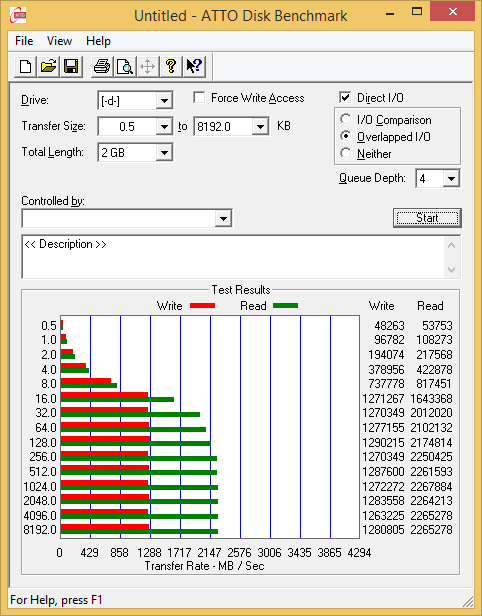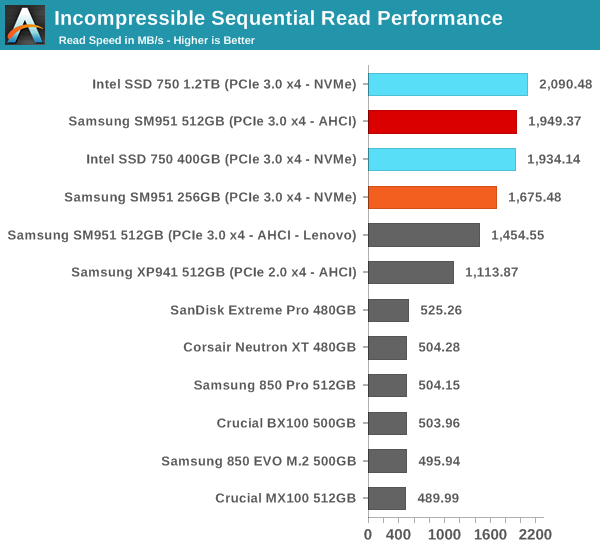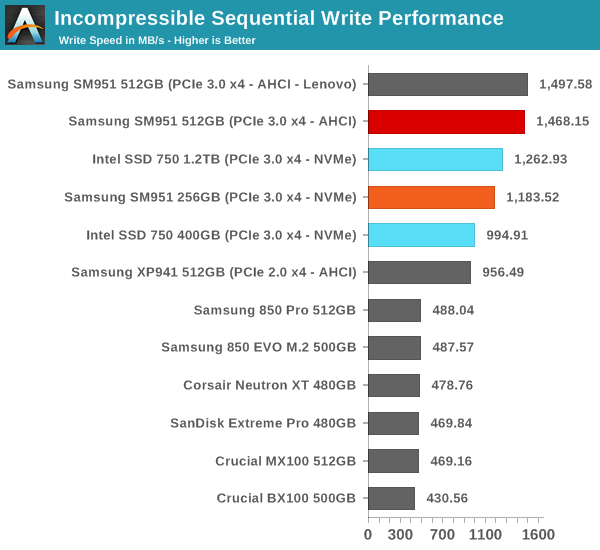Samsung SM951-NVMe (256GB) PCIe SSD Review
by Kristian Vättö on June 25, 2015 9:40 AM ESTATTO - Transfer Size vs Performance
I'm keeping our ATTO test around because it's a tool that can easily be run by anyone and it provides a quick look into performance scaling across multiple transfer sizes. I'm providing the results in a slightly different format because the line graphs didn't work well with multiple drives and creating the graphs was rather painful since the results had to be manually inserted cell be cell as ATTO doesn't provide a 'save as CSV' functionality.
 |
|||||||||
AS-SSD Incompressible Sequential Performance
I'm also keeping AS-SSD around as it's freeware like ATTO and can be used by our readers to confirm that their drives operate properly. AS-SSD uses incompressible data for all of its transfers, so it's also a valuable tool when testing SandForce based drives that perform worse with incompressible data.












74 Comments
View All Comments
kspirit - Saturday, June 27, 2015 - link
Thank you, I appreciate the response. I'll check it out :)fastfood8891 - Thursday, June 25, 2015 - link
@Kristian VättöFor that one graph on page 3, why do you divide IOPS by the standard deviation? I understand you are showing that this drive is a lot more consistent than the others, I just wonder what the mathematical intuition behind this value is.
Kristian Vättö - Thursday, June 25, 2015 - link
It's just a key ratio. Standard deviation alone is a bad metric because it doesn't take the performance into account at all. It wouldn't be fair to compare stdev of a drive that does 15K IOPS against a drive that does 5K IOPS because if the two had equivalent stdev the impact would be much more severe on the slower one (e.g. frequent 50% drops in performance, whereas only 15% for the 15K IOPS drive).krumme - Friday, June 26, 2015 - link
Enjoy this man guys while we have him. This is competence at its finest.JellyRoll - Friday, July 10, 2015 - link
Well, if competency consists of him originally presenting test results wrong in several articles, and then a reader correcting him in the comments of the 750 article, and then him adopting the correct method...well, yeah. Then that is competency. (that is what happened)fastfood8891 - Saturday, June 27, 2015 - link
makes sense, thank you for the explanation.Samus - Thursday, June 25, 2015 - link
First gen. Give it time. Seems like a dedicated nvme controller (ala Intel) would improve random performance...it looks like this controller is already running near its capability in AHCI mode.But as with everything nand, mature firmware will help
willis936 - Thursday, June 25, 2015 - link
Exciting stuff. Does anyone know if current broadwell laptops can be retrofitted with nvme M.2 drives in the future? Specifically the xps 13 2015. It's a hot item with poor storage options.extide - Thursday, June 25, 2015 - link
That laptop, probably yes. Best place to check would be the notebookreview forums -- they should have a specific forum for that laptop and you can ask there, or see if someone has already swapped in a PCIe drive. -- You need to verify 1) That the m.2 slot is actually pcie and not just sata, and 2) that it supports nvme in the bios, but being broadwell, you can probably assume it does.lilmoe - Thursday, June 25, 2015 - link
Is there any tangible difference in CPU utilization using NVMe? Would be nice if there was a graph...